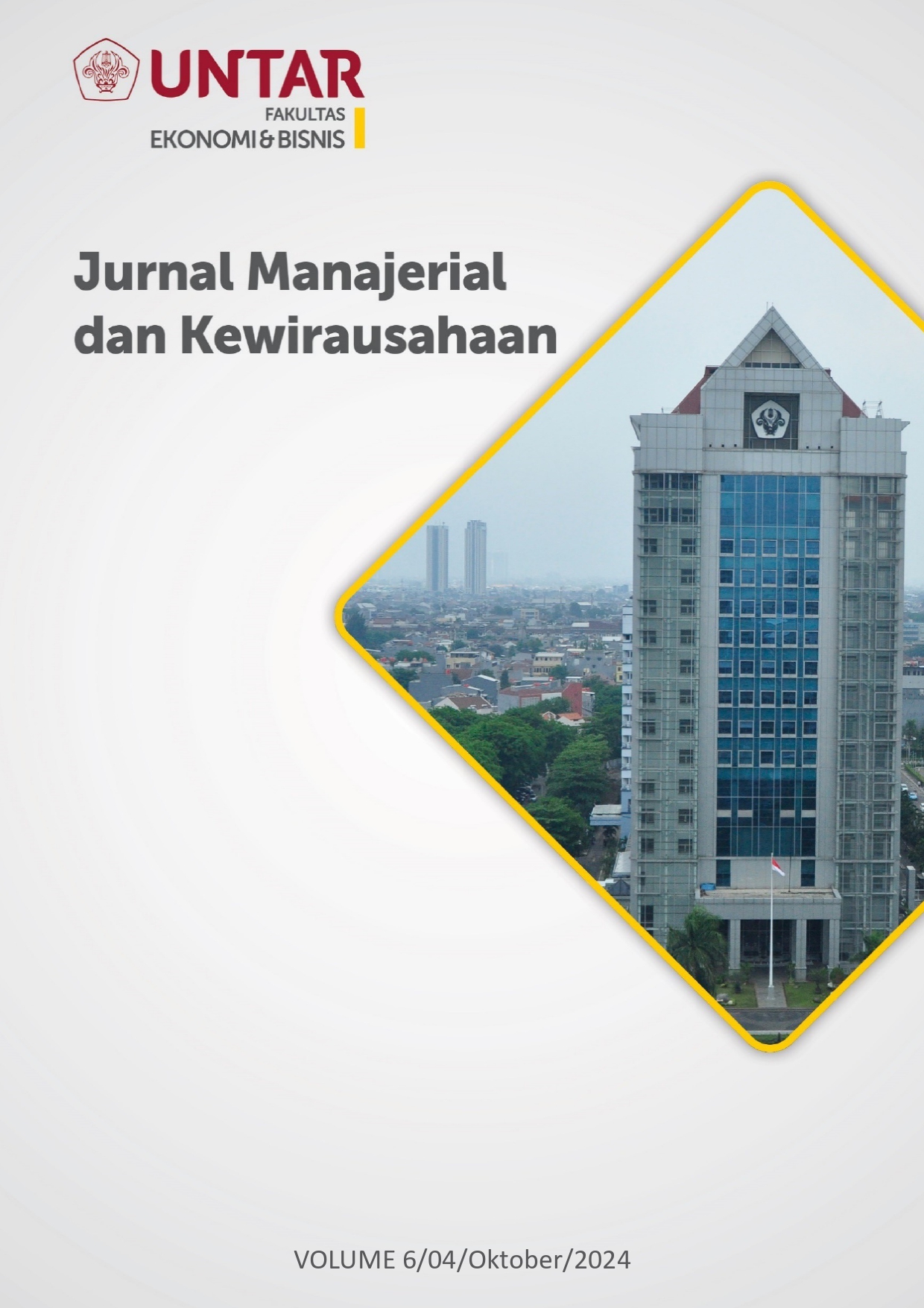Efikasi Diri Berwirausaha, Motivasi Berwirausaha, dan Pemasaran Digital terhadap Keberhasilan Usaha Kuliner
Main Article Content
Abstract
Micro, Small and Medium Enterprises (MSMEs) are a type of business unit that is popular with Indonesian people today. MSMEs are proven to be a large percentage contributor to GDP and labor absorption nationally and the business index continues to increase every quarter. The Indonesian government is paying more attention to MSMEs through programs and other facilities so that more and more people are interested in building an MSME. One of the MSME sectors, namely the culinary sector which includes food and beverages, occupies the first position in the dominant sector for this business unit. Factors that influence business success for Culinary MSMEs are entrepreneurial self-efficacy, entrepreneurial motivation, and digital marketing. This research aims to determine the influence of entrepreneurial self-efficacy, entrepreneurial motivation, and digital marketing on the success of Culinary MSME businesses in West Jakarta. This research uses quantitative research methods with the sample selection technique used is purposive sampling, of 70 respondents who are culinary MSME business owners in the Duri Kosambi sub-district area, including Taman Semanan Indah, Kosambi Baru, and Kresek Raya. The data in the study were analyzed using SEM-PLS via SmartPLS version 4 software. The research results show that entrepreneurial self-efficacy, entrepreneurial motivation, and digital marketing have a positive and significant effect on business success. It is hoped that the results of this research can help MSMEs to develop and open up new ideas for the government as the main supporter of MSMEs to create programs that can help Indonesian MSMEs become more advanced.
Article Details
Section

This work is licensed under a Creative Commons Attribution-NonCommercial-ShareAlike 4.0 International License.
This work is licensed under a Jurnal Muara Ilmu Ekonomi dan Bisnis Creative Commons Attribution-ShareAlike 4.0 International License.,/p>
References
Avery, J., Steenburgh, T. J., Deighton, J., & Caravella, M. (2012). Adding Bricks to Clicks: Predicting the Patterns of Cross-Channel Elasticities Over Time. Journal of Marketing, 76(3), 96-111. https://doi.org/10.1509/jm.09.0081
Chen, C. C., Greene, P. G., & Crick, A. (1998). Does Entrepreneurial Self-Efficacy Distinguish Entrepreneurs From Managers?. Journal of Business Venturing, 13(4), 295-316. https://doi.org/10.1016/S0883-9026(97)00029-3
Chittithaworn, C., Islam, M. A., Keawchana, T., & Yusuf, D. H. M. (2011). Factors Affecting Business Success of Small & Medium Enterprises (SMEs) in Thailand. Asian Journal of Social Science, 7(5), 180-190. https://doi.org/10.5539/ass.v7n5p180
Direktorat Jenderal Perbendaharaan Kementerian Keuangan. (2023). Kontribusi UMKM dalam Perekonomian Indonesia. Kementerian Keuangan RI. https://djpb.kemenkeu.go.id/kppn/lubuksikaping/id/data-publikasi/artikel/3134 kontribusi-umkm-dalam-perekonomian-indonesia.html, diakses pada 31 Desember 2023.
Ghozali, I., & Latan, H. (2020). Partial Least Squares: Konsep, Teknik, dan Aplikasi Menggunakan Program SmartPLS 3.0 (2nd ed.). Badan Penerbit – Undip.
Hair, J.F., Sarstedt, M., & Ringle, C.M. (2019). Rethinking some of the rethinking of partial least squares. European Journal of Marketing, Forthcoming. https://doi.org/10.1108/EJM-10-2018-0665
Hardi, K. & Puspitowati, I. (2021). Success Factors of Small and Medium-Sized Enterprises in Jakarta. Dalam 3rd Tarumanagara International Conference on the Application of Social Sciences and Humanities, 1070-1075. https://doi.org/10.2991/assehr.k.220404.169
Hartanto, N. & Soelaiman, L. (2021). Factors Affecting Entrepreneurial Opportunity Recognition among Food and Beverage SMEs. Dalam International Conference on Economics, Business, Social, and Humanities, 486-491. https://dx.doi.org/10.2991/assehr.k.210805.076
Irwanto, A. & Ie, M. (2023). Pengaruh Efikasi Diri, Pengetahuan Kewirausahaan, Motivasi Kewirausahaan terhadap Keberhasilan UMKM F&B di Jakarta Barat. Jurnal Manajerial dan Kewirausahaan, 5(1), 259-267. https://doi.org/10.24912/jmk.v5i1.22674
Kementrian Koordinator Bidang Perekonomian Republik Indonesia. (2022). Menko Airlangga Ungkap Kunci Keberhasilan Pengembangan UMKM. Siaran Pers. HM.4.6/417/SET.M.EKON.3/08/2022
Kompas. (2022). Airlangga Hartanto Dorong Peningkatan Mutu Produk UMKM dengan Standarisasi. https://umkm.kompas.com/read/2022/12/01/070000883/airlangga-hartanto dorong-peningkatan-mutu-produk-umkm-dengan-standarisasi, diakses pada 30 Desember 2023.
Lamidi & Rahadhini, M. D. (2021). The effect of digital marketing and financial inclusion on business sustainability through marketing performance culinary msme’s in Surakarta. Journal of Economics, Finance and Management Studies, 4(6), 716-723. https://doi.org/10.47191/jefms/v4-i6-06
Nuryanto, U. W., Purnamasari, R., Mz, M. D., Sutawidjaya, A. H., & Saluy, A. B. (2019). Effect of self-efficacy, motivation on entrepreneurship, entrepreneurship education, and social environment against interest in entrepreneurship on micro, small and medium enterprises businesses in serang regency. Jurnal Akademi Akuntansi, 2(2), 40-57.
Rakić, B., & Rakić, M. (2020). Digital marketing of tourism organizations in function of tourism promotion in Serbia. Tourism International Scientific Conference Vrnjačka Banja- TISC, 5(1), 399-415.
Santoso, S. & Oetomo, B. S. D. (2018). Influence of Motivation and Self-Efficacy on Entrepreneurial Intention to Run a Business. Expert Journal of Marketing, 6(1), 14-21.
Shaheen, Noor, & Al-Haddad, S. (2018). Entrepreneurial self-efficacy and entrepreneurial behavior. International Journal of Development and Sustainability 7: 2385-402.
Srimulyani, V. A., & Hermanto, Y. B. (2021). Impact of entrepreneurial self-efficacy and entrepreneurial motivation on micro and small business success for food and beverage sector in east Java, Indonesia. Economies, 10(1), 10.
Stajkovic, A. D., & Luthans, F. (1998). Self-efficacy and work-related performance: A meta analysis. Psychological bulletin, 124(2), 240.
Suroso, A., & Rafinda, A. (2021). Motivation of SME adopt digital marketing. International Journal of Innovation, Creativity and Change, 15(9), 696-710.
Venesaar, Ene. (2006). Students’ Attitudes and Intentions toward Entrepreneurship at Tallinn University of Technology.TUTW
Wibowo, B. D., & Ardianti, R. R. (2014). Entrepreneurial Motivation Pengusaha Sektor Formal Dan Sektor Informal di Jawa Timur. Agora, 2(1), 79-92.
Wijaya, W. R. & Handoyo, S. E. (2023). Pengaruh Media Sosial, Kreativitas, Motivasi terhadap Keberhasilan Usaha UMKM Kuliner Jakarta Utara. Jurnal Manajerial dan Kewirausahaan, 5(3), 797-804. https://doi.org/10.24912/jmk.v5i3.25449

